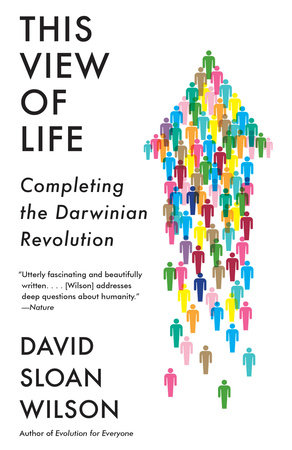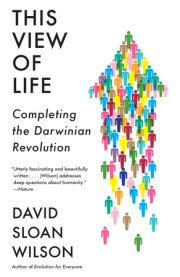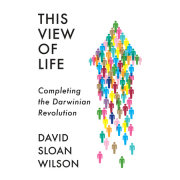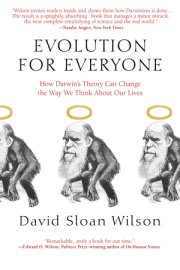from the Introduction: Whatever you think you currently know about evolution, please move it to one side to make room for what I am about to share in the pages of this book. I think you’ll find that my argument doesn’t fall into any current category. Politically it isn’t left, right, or libertarian. It’s not anti-religious and it enables us to think more deeply about religion than ever before. Above all, it moves us in the direction of sustainable living at all scales. Who doesn’t want to improve their personal well-being; their families, neighborhoods, schools, and businesses; their governments and economies; and their stewardship of the natural world? These goals are within reach—but only if we see the world through the lens of the right theory.
To begin, we need to do a bit of clear thinking on what science is. It is commonly portrayed as a contest between theories that are based on a common stock of observations. First we see and then we theorize. Theories that do the best job of explaining the observations are accepted, only to be challenged by another round of theories, and so on, bringing our knowledge of the world closer to reality.
The problem with this view of science is that the common stock of observations is nearly infinite. We cannot possibly attend to everything, so a theory—broadly defined as a way of interpreting the world around us—is required to tell us what to pay attention to and what to ignore. We must theorize to see. A new theory doesn’t just posit a new interpretation of old observations. It opens doors to new observations to which the old theories were blind.
Albert Einstein understood this point when he wrote, “It is the theory that decides what we can observe.” He was corresponding with his colleague Werner Heisenberg about electron orbits inside atoms. There was no way to directly observe electron orbits at the time, and Heisenberg thought it prudent to theorize on the basis of what can be observed. Einstein understood that theorizing about entities that cannot yet be seen can lead to useful predictions about what can be seen, but which had previously gone unnoticed.
Charles Darwin experienced the blindness that comes from lack of the right theory as a young man on a fossil hunting expedition with his professor Adam Sedgwick. The valley in Wales that they visited had been scoured by glaciers and therefore had no fossils. The evidence for glaciers lay all around them—the scored rocks, the perched boulders, the lateral and terminal moraines, all typical of a glaciated landscape. Yet Darwin and Sedgwick were blind to the evidence because the theory that vast sheets of ice had once covered much of the northern hemisphere had not yet been proposed. They didn’t know what they should have been looking for. Darwin commented in his autobiography that “a house burnt down by fire did not tell its story more plainly than did this valley. If it had still been filled by a glacier, the phenomena would have been less distinct than they are now.”
Darwin went on to contribute his own eye-opening discoveries with his theory of natural selection. The theory is amazingly simple: 1) Individuals vary; 2) Their differences often have consequences for survival and reproduction; 3) Offspring resemble their parents. Given these three conditions, populations will change over time. Traits that contribute to survival and reproduction will become more common. Individuals will become well adapted to their environments.
The theory of natural selection is so simple and rests upon such firm assumptions that it seems obvious in retrospect. As Thomas Huxley famously remarked upon encountering it for the first time, “How stupid of me not to have thought of that!” Nevertheless, for those who first started to explore the implications, it was as if the scales had fallen from their eyes. Wherever they looked—the fossil record, comparative anatomy, the geographical distribution of species, and the many wonderful contrivances that adapt organisms to their environments—they found confirming evidence. In the contest of theories, the biblical account of creation didn’t stand a chance. By 1973, the geneticist Theodosius Dobzhansky could declare that “nothing in biology makes sense except in the light of evolution.”
My Story I was a graduate student at Michigan State University in 1973 and my personal experience can help to explain what Dobzhansky meant by his imperious-sounding proclamation. As someone who loved the outdoors and aspired to be a scientist, I decided to become an ecologist so I could study animals in their natural environments. In keeping with the old joke about experts knowing more and more about less and less until they know everything about nothing, my research was focused on the feeding behavior of a tiny aquatic crustacean called a copepod. Even for this esoteric subject, the possibilities were endless. Copepods might select their food in any number of ways and a theory was needed to narrow the possibilities. Evolutionary theory predicts that copepods should feed in ways that enhance their survival and reproduction. This could mean maximizing the amount of energy harvested, feeding in a way that avoids being eaten by predators, or other possibilities that depend upon the details of the environment. No theory leads directly to the right answer. The best that a theory can do is to narrow the field of possibilities. In this case, I predicted that copepods might selectively graze on larger algae rather than harvesting algae without respect to size, which would increase their rate of energy intake. My prediction turned out to be correct and resulted in my first publication in 1973. I had added one small but solid brick to the edifice of scientific knowledge. I couldn’t vouch for Dobzhansky’s claim for all of biology, but I could testify that evolutionary theory had helped to make sense of my little corner.
Later that year I traveled to Costa Rica to attend a course in tropical ecology run by the Organization for Tropical Studies (OTS), a network of field stations run by a consortium of universities that is still going strong after fifty years. It was a life-changing experience. Anyone who loves nature is thrilled by the tropics, but we were seeing all of those wonderful plants and animals through the lens of evolutionary theory—the same lens that informed my esoteric research. I realized that I didn’t need to spend my life studying copepods. I could pick any creature or topic that interested me and quickly start asking intelligent questions based on the logic of evolutionary theory. It was the opposite of the old joke about experts knowing more and more about less and less. Becoming an expert in evolutionary theory was like receiving a passport to the study of all aspects of life.
Ever since, I have used evolutionary theory to study a multitude of creatures and topics. I have also witnessed my field of biology become ever more sophisticated in observational techniques. The modern biologist is like Darwin with superhuman powers of observation. He or she can catalog entire genomes and track the patterns of gene expression (epigenetics); can trace neural pathways inside the brain; can monitor the movement of animals via satellite; can measure climate change in the distant past with a high degree of accuracy; can experiment with evolution in the laboratory using microbes that can be frozen and brought back to life to compare with their own descendants.
These technological marvels bring the common stock of observations well beyond anything imagined in Darwin’s day. The role of evolutionary theory in making sense of all this information is more important than ever before. Dobzhansky’s 1973 statement that nothing in biology makes sense except in the light of evolution has withstood the test of time. Yet for many people the word “biology” conjures up a different set of associations than words such as “human” or “culture.” To proceed further, we need to expand the scope of what we consider biology.
How About Us? Darwin was convinced that his theory could explain the length and breadth of humanity, in addition to everything else more typically associated with biology. He observed and kept notes on his children with the same discerning eye that he observed barnacles and orchids. Following upon
On the Origin of Species, he developed his thoughts at length in
The Descent of Man and other works.
Yet, as evolutionary biology became a branch of science, the study of humanity did not proceed along the same track. The problem was not just the collision with religious belief that remains with us today. Some people who were fully comfortable with a naturalistic conception of the world still had an allergic reaction to evolutionary theory in relation to human affairs. As early as the 1870s, the threat that they perceived was given a name: social Darwinism.
According to most people’s conception of social Darwinism, the haves and have-nots of society are equivalent to the fit and unfit of evolutionary theory. It is nature’s way for the fit to replace the unfit. Interfering with the process would degrade the species and lead to the collapse of society. It is not selfish for the fit to replace the unfit; it is a moral imperative. Policies that flow from this logic include laissez-faire capitalism, withholding welfare from the poor, forced sterilization, and genocide.
After the excesses of the Gilded Age, the eugenics policies enacted in America and Britain, and the genocidal horrors of World War II, the idea of using evolutionary theory to formulate public policy became unthinkable. The stigma carried over to the academic disciplines classified as the social sciences and humanities. While these areas of study developed into sophisticated bodies of knowledge, they largely avoided engaging with evolutionary theory. Most humanist scholars were happy to accept Darwin’s theory for the study of the rest of life, our physical bodies, and a few basic instincts such as to eat and have sex, but insisted that our rich behavioral and cultural diversity operated according to a different set of rules.
Copyright © 2019 by David Sloan Wilson. All rights reserved. No part of this excerpt may be reproduced or reprinted without permission in writing from the publisher.







